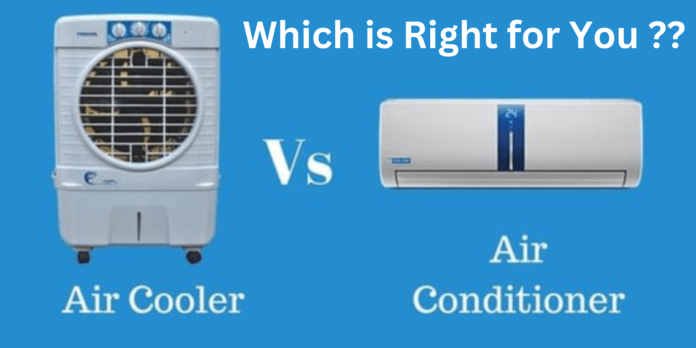As temperatures rise, the need for effective cooling solutions becomes paramount. When it comes to beating the heat, two popular options stand out: air coolers and air conditioners. Each offers unique features and benefits, but deciding which one is right for you depends on various factors. In this comprehensive comparison, we’ll explore the differences between air coolers and air conditioners, their pros and cons, and help you make an informed decision to achieve cool comfort in your home.
Understanding Air Coolers: Air coolers, also known as evaporative coolers, operate by drawing warm air through water-saturated pads, where it is cooled by evaporation, and then circulated into the room. These devices are most effective in dry climates where humidity levels are low. Air coolers are often more energy-efficient and environmentally friendly compared to air conditioners, as they consume less electricity and do not rely on chemical refrigerants.
Read more: The Benefits of Air Cooler over Air Conditioner: A Comprehensive Guide
Pros of Air Coolers:
- Energy Efficiency: Air coolers consume significantly less energy than air conditioners, making them a cost-effective cooling solution, especially in regions with high electricity costs.
- Environmentally Friendly: Air coolers use water as a cooling agent and do not emit greenhouse gases or ozone-depleting substances, making them environmentally sustainable.
- Improved Air Quality: Air coolers humidify and filter the air as they cool, removing dust, allergens, and other pollutants, which can be beneficial for individuals with respiratory issues.
- Portability: Many air coolers are lightweight and portable, allowing for easy relocation between rooms or outdoor spaces as needed.
- Cost-Effectiveness: Air coolers are typically more affordable to purchase and maintain than air conditioners, making them an attractive option for budget-conscious consumers.
Read more: 101 Technology That Changed Your Life
Cons of Air Coolers:
- Limited Cooling Effectiveness: Air coolers are most effective in dry climates with low humidity levels. In humid conditions, their cooling efficiency diminishes, and they may not provide sufficient relief from the heat.
- Regular Maintenance: Air coolers require regular maintenance, including cleaning and refilling the water tank, to prevent the growth of mold, bacteria, and mineral deposits.
- Noise Levels: Some air coolers can produce noise during operation, which may be bothersome, especially in quiet environments or during sleep.
- Limited Cooling Range: Air coolers are suitable for cooling smaller areas or individual rooms but may struggle to maintain consistent temperatures in larger spaces.
Understanding Air Conditioners: Air conditioners work by removing heat and moisture from the air through a refrigeration cycle, resulting in cooler, drier air being circulated into the room. These units are effective in both dry and humid climates and offer precise temperature control for optimal comfort. Air conditioners come in various types, including window units, split systems, and portable units, each offering distinct advantages.
Read more: Sevenhugs Launches Latest Technology Smart Remote
Pros of Air Conditioners:
- Superior Cooling Performance: Air conditioners are capable of achieving lower temperatures and maintaining consistent cooling even in humid conditions, providing greater comfort during hot weather.
- Precise Temperature Control: Air conditioners allow users to set and maintain specific temperature levels, providing personalized comfort according to individual preferences.
- Dehumidification: Air conditioners remove excess moisture from the air, reducing humidity levels and creating a more comfortable indoor environment, particularly during humid weather.
- Wide Coverage Area: Air conditioners are suitable for cooling larger spaces, such as entire homes or commercial buildings, offering comprehensive cooling coverage.
- Quiet Operation: Modern air conditioners are designed to operate quietly, minimizing noise disturbance and providing a peaceful indoor environment.
Read more: How to Manage Multiple Workloads on Single Platform with Snowflake?
Cons of Air Conditioners:
- Higher Energy Consumption: Air conditioners consume more electricity than air coolers, resulting in higher energy bills, particularly during peak cooling seasons.
- Initial Cost: The upfront cost of purchasing and installing an air conditioner is typically higher than that of an air cooler, making it a more significant investment.
- Environmental Impact: Air conditioners rely on chemical refrigerants, which can contribute to ozone depletion and global warming if released into the atmosphere. Proper disposal and recycling of old units are essential to minimize environmental impact.
- Installation Requirements: Some types of air conditioners, such as split systems, require professional installation, which adds to the overall cost and may require modifications to the building structure.
Choosing the Right Cooling Solution for You: When deciding between an air cooler and an air conditioner, several factors should be considered, including climate, budget, cooling requirements, and personal preferences. In hot, dry climates, where humidity levels are low, an air cooler may offer a cost-effective and environmentally friendly cooling solution. However, in humid regions or for those seeking precise temperature control and comprehensive cooling coverage, an air conditioner may be the preferred choice.
Conclusion: Both air coolers and air conditioners offer effective cooling solutions to combat the heat and create a comfortable indoor environment. By understanding the differences, advantages, and limitations of each option, you can make an informed decision that aligns with your cooling needs, budget, and environmental considerations. Whether you opt for the energy-efficient simplicity of an air cooler or the precise cooling performance of an air conditioner, achieving cool comfort in your home is within reach.












